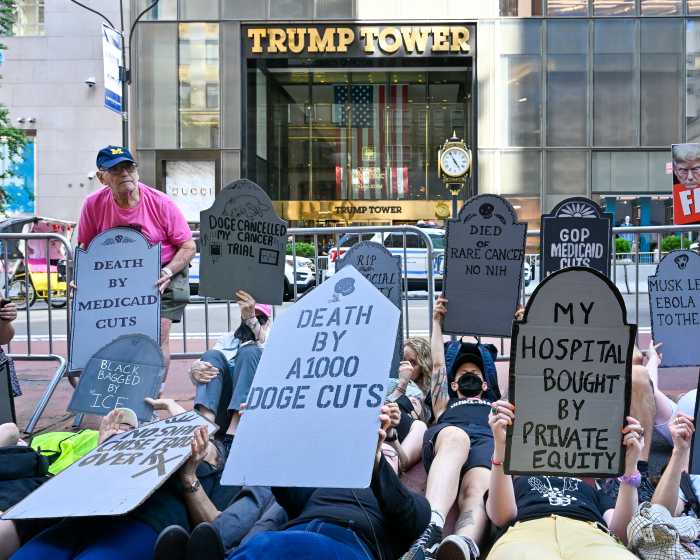By ALINE REYNOLDS | Though the National Sept. 11 Memorial Museum didn’t open on the 11th anniversary of 9/11, as hoped for, local residents and other 9/11 survivors had some good news to celebrate that week.
On the eve of the anniversary, the federal government announced that it will be adding dozens of cancers to the James L. Zadroga 9/11 Health and Compensation Act — a landmark moment in the history of health care for the thousands of survivors that fell ill since that fateful fall.
Per the April recommendation of the Scientific Technical Advisory Committee (S.T.A.C.), Dr. John Howard, the Zadroga Act’s health administrator, decided to add more than 50 types of cancers to the law — thereby authorizing treatment and financial reimbursement to area residents and business owners, first responders and others who contracted the disease from their exposure to ground zero. Howard’s decision mirrors the proposal of the S.T.A.C., which convened several times earlier this year to determine which cancers are medically linked to exposure to ground zero toxins.
The soon-to-be added cancers include cancer of the nose, the larynx, the esophagus, the stomach, the colon, the liver, the breast, the ovary and the thyroid. Howard’s decision will become effective on Fri., Oct. 12, 30 days after its publication in the federal register, which occurred the day after this year’s 9/11 anniversary.
When patients of the World Trade Center Centers of Excellence — at Bellevue Hospital, Mount Sinai Hospital and the Fire Department of New York — will begin to receive cancer treatment, however, is unclear. According to the Centers for Disease Control and Prevention, patients can start the process of applying for treatment once the cancer ruling becomes effective.
In his written decision, Howard stressed that the addition of these cancers to the law does not guarantee that a particular individual’s condition will be certified for treatment. All cancer-stricken 9/11 survivors and responders must be assessed for their symptoms, exposure levels and personal medical history before being determined eligible for chemotherapy and other forms of care at the Centers of Excellence. Those who do not qualify for care are allowed to appeal Howard’s decision.
Though the feds came short of quantifying the benefits associated with the federally subsidized health programs, higher survival rates for cancer patients are expected, since enrollees will receive a higher quality of care than they would otherwise. Says the ruling, “Barriers may exist to access and delivery of quality health care services for cancer patients in the absence of the services provided by the W.T.C. Health Program.”
S.T.A.C. member Catherine McVay Hughes, who chairs Community Board 1, was particularly pleased to hear that thyroid and certain other cancers that the S.T.A.C. nearly vetoed for addition were ultimately included in the list.
“It’s unbelievable,” she said of the announcement. “This is a huge milestone.”
As for the start of cancer treatment at the W.T.C. Centers of Excellence, Hughes said, “It’s something we’ll have to ramp up quickly to address the increasing need.”
Politicians representing Lower Manhattan immediately wrote to the press following the news. U.S. Representatives Carolyn Maloney, Jerrold Nadler and Peter King issued a joint statement that called Howard’s decision “great news for the responders, survivors and their families, who have long known — and have lived with — the reality that 9/11 dust and toxins cause cancer.”
The politicians added, “We look forward to continuing to work closely with Dr. Howard as he and his team finalize the cancer coverage certification process to accomplish this goal.”
Assembly Speaker Sheldon Silver said that the decision to include cancer to the Zadroga Act will “literally save lives.”
“We have a moral obligation to those who put themselves in harm’s way for their fellow New Yorkers, and this will further our goal of meeting that obligation,” said the Speaker. “The eleventh anniversary of 9/11 serves to remind us of the tragedy of those we lost, as well as of the sacrifices made by those who have toiled to rebuild our community.”
According to City Council Member Margaret Chin, the announcement is the fulfillment of a promise to provide medical care for hundreds of first responders and area residents. “This decision will help ease the financial burden of co-pays for repeated doctors’ visits and provide access to life-saving treatments,” she said. “Most importantly, it confirms that, years after the clean-up and recovery efforts, the toxic dust first responders were exposed to has caused rare and serious health problems, including cancer.”
The addition of cancer, however, will place financial strain on the compensation portion of the law, which is valued at a fixed amount of $2.775 billion. To solve the problem, legislators hope to reauthorize the existing law so that money can be added to it.
U.S. Senator Kirsten Gillibrand had no update concerning a new bill she is planning to introduce to Congress that would extend the deadline by which people would have to apply for financial compensation under the law.
Another financial hurdle for Zadroga surfaces
The feds’ announcement to add cancer to the Zadroga Act was shadowed by a disappointing development regarding federal funding. Following Dr. Howard’s cancer decision, President Obama’s budget office released a report detailing budget cuts under last year’s bipartisan sequestration bill that, if enacted, would cut $38 million from the Zadroga Act in 2013 and close to $300 million overall.
The awarding of claims toward the law’s Victim Compensation Fund was supposed to begin once the cancers are officially added next month, according to V.C.F. Special Master Sheila Birnbaum. But in a Sept. 18 phone interview, Birnbaum conceded that she didn’t know how the forthcoming cut will impact the V.C.F.’s timeline and budget.
“I just don’t know how it’s going to play out,” she said. “It’s another complication. We’re just going to have to work through it, like all the other issues we’ve been working through.”
The National Institute for Occupational Safety and Health, the law’s administrator, declined to comment.
Sept. 11 first responder John Feal, who heads the FealGood Foundation (F.G.F.), a 9/11 advocacy group, called the budget shortfall “completely unacceptable.”
“As F.G.F. members, union leaders and first responder advocates walked the halls of Congress only two years ago urging members of Congress to enact the Zadroga Act,” he said, “legislative members demanded that we ensure funding for the Zadroga program in cohesion with Congress’s requirement that all new legislation not add to the federal deficit.
Feal continued, “For Congressional leaders to now potentially raid that funding flies in the face of reason.”
In a statement, Gillibrand said she thought sequestration was an “ill-conceived” concept from the start, which is one of the reasons she voted against the bill. “Nothing exemplifies this unbalanced and draconian approach to deficit reduction more than asking our heroes who have already sacrificed so much to sacrifice yet again so that Republican leadership could appease their special interests,” she said. “Our 9/11 heroes who answered the call of duty should be treated with the same dignity as our veterans.”
Members of the W.T.C. Health Program should contact their Center of Excellence to begin the certification process. For more information, current and prospective patients should call 1-888-982-4748 or visit www.cdc.gov/wtc.



































